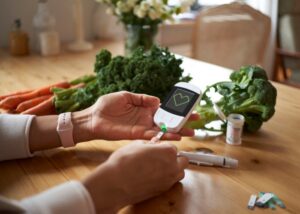
Diabetes rates in the United States are on an upward trend. According to the Centers for Disease Control, roughly 37 million people in the US have diabetes; of that number, 8.5 million are undiagnosed. Additionally, an estimated 38% of the adult population (age 18+) has prediabetes. According to the American Diabetes Association, up to 70% of these individuals will develop diabetes.
There are two types:
Diabetes type 1 typically develops in children, teens, and young adults but can occur at any age. It is an autoimmune disorder in which the body’s immune system attacks the pancreatic beta cells responsible for producing insulin. Insulin is a hormone that helps move glucose from the blood to the cells in the muscles, liver, and fat, which can then be used for energy. If you have diabetes, your body cannot produce enough insulin to move the sugar where it needs to go, so it remains in the bloodstream, which can be very damaging to the body.
Diabetes type 2 most often develops in people over 45, but more children and young adults are also developing it. You are at risk for type 2 diabetes if you have prediabetes, are overweight, have a parent, brother, or sister with it, developed gestational diabetes during pregnancy, or do not get regular physical activity.
Do certain races/ethnicities have a higher incidence of diabetes?
- American Indians and Pacific Islanders are more than twice as likely to have diabetes as Whites.
- Diabetes is more common in the Black and Asian communities than Whites.
- Hispanics are 17% more likely to have type 2 diabetes than non-Hispanic Whites.
Several factors contribute to higher rates of diabetes. These factors include diets high in fat and sugar combined with a sedentary lifestyle, higher rates of visceral (belly fat), and lower levels of potassium in the diet. Potassium is not naturally produced by the body. It must be consumed and can be found in foods such as bananas, spinach, sweet potatoes and yogurt.
Some type 2 diabetes risk factors are modifiable.
“Prioritizing exercise and a healthy diet can reduce your risk for type 2 diabetes,” said Dr. Sherri Arledge, medical oncologist at Southern Cancer Center. “Staying active and making wise food choices can help delay or prevent the onset of diabetes and the complications that come with it.”
Does diabetes put me at risk for certain types of cancer?
Insulin resistance can create more fat cells and make it harder to break them down. The resulting weight gain and inflammation can raise your risk for several types of cancer. Additionally, insulin therapy for diabetes can stimulate cell growth, which may also increase cancer risk.
Type 2 diabetes has been linked to multiple cancer types, including pancreatic, liver, colorectal, and breast cancers:
Pancreatic Cancer: Studies have indicated that the link between pancreatic cancer and diabetes goes both ways, meaning diabetes can be both a risk factor and a result/sign of pancreatic cancer in new-onset cases.
Liver Cancer: Research has also shown that diabetes can be a risk factor for liver cancer. Cases of liver cancer can be linked to non-alcoholic fatty liver disease (NAFLD), which more than 70% of people with diabetes have due to insulin resistance.
Colorectal Cancer: Diabetes and colorectal cancer share several common risk factors, including obesity, a sedentary lifestyle, and smoking. However, diabetes is also considered an independent risk factor for developing colorectal cancer. Further, some studies have indicated that diabetic men have a significantly higher risk than women of developing colorectal cancer.
Breast Cancer: There is a strong association between diabetes and breast cancer in pre- and post-menopausal women. Research has suggested that diabetes may contribute to the growth of tumors. A decrease in estrogen resulting from insulin resistance may increase cancer risk in organs with estrogen receptors, such as the breasts.
Speak with your doctor if you are concerned about your risk for diabetes and cancer, and be sure to follow recommended cancer screening guidelines. If you need food or financial assistance to help kickstart your health improvement plan, connect to local resources at The US Oncology Network’s social care network by findhelp.
How can you manage diabetes if you have cancer?
If you are balancing diabetes and a cancer diagnosis, there are steps you can take to manage your health:
You may experience a loss of appetite, so try eating frequent, small portions of calorie-rich and nutrient-dense foods that balance your blood sugar and provide you with the energy needed to fight cancer. Add avocado, olive oil, eggs, and nuts to your meals. Incorporate milk, milk substitutes, or yogurt into your dishes.
Consume naturally sweet foods, such as fruit and nut butter, which can stimulate your appetite. Just eat these foods in moderation to align with the guidelines suggested for you.
Keep a record of the foods you eat and your blood sugar levels so you can share this information with your care team. Ask your caregivers to help you maintain this record.
Speak with your cancer and diabetes care teams for specific recommendations or resources. Your providers are here to help.
Sources:
Diabetes Statistics – DRIF (diabetesresearch.org)
National Diabetes Statistics Report | Diabetes | CDC
What Is Type 1 Diabetes? | CDC
Type 2 Diabetes: How Race Plays a Part (webmd.com)
Visceral Fat: What It Is and How to Get Rid of It (healthline.com)
How Does Race Affect Diabetes Risk? (aarp.org)
Diabetes and cancer: Epidemiological and biological links – PMC (nih.gov)
Diabetes as a Risk Factor for Breast Cancer – PMC (nih.gov)
Cancer and diabetes: The connection is in your DNA (cancercenter.com)
I Have Diabetes and Cancer. What Can I Eat? | CDC
Prediabetes: A high-risk state for developing diabetes – PMC (nih.gov)
